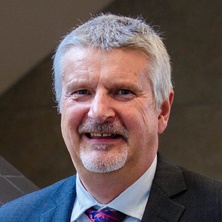Staff and students from the UQ School of Pharmacy have stepped up to ease the pressure on the health workforce during the COVID-19 pandemic.

Senior Lecturer Dr Adam La Caze said early discussion with professional colleagues had highlighted the important role that the university community plays in the pharmacy workforce.
“As hospital pharmacies started to prepare their workforce for the pandemic, they recognised that their staff would be working at the highest levels of their scope of practice and that pharmacy students, many of whom were already on placement, could make an important contribution to the workforce,” Dr La Caze said.
“Community pharmacy colleagues were extremely busy handling the response to the pandemic in the community where many consumers were ensuring they had sufficient medication supplies for themselves and the people they care for which led to a ‘toilet paper effect’ on some medications and local medication shortages.
“Pharmacists have been working hard to maintain medication supply to individual consumers as well as the community as a whole and this has led to a very busy and, at times, emotionally-charged environment in community pharmacy.
“All of this is happening at the same time that these workplaces seek to put in their own processes to adhere to social distancing requirements and figure out how to provide their services in a way that keeps their patients, their customers and themselves safe.
“Overall this meant that many places where looking to take on additional students.”
Dr La Caze facilitated a School response to link students who were in a position to help in the workforce with pharmacists needing assistance.
“About 70 undergraduate students indicated their availability to assist in Queensland Health hospitals and 50 indicated their availability to help in community pharmacy,” he said.
“Close to 30 community pharmacies expressed their interest in taking a student volunteer and a number of pharmacies indicated the availability of paid positions.
“Queensland Health hospitals are working through their processes for employing students and some are taking on short-term volunteers while they complete these processes.
“The profession’s response to the pandemic highlights the important contribution that students make in the profession and workforce.”

Associate Professor Ian Coombes, Adjunct in the UQ School of Pharmacy and Director of Pharmacy at the Royal Brisbane and Women’s Hospital (RBWH) said students have been integral to hospital operations during the pandemic.
“While some departments have stopped taking undergraduate students and even let their interns go, at the RBWH we have engaged with the UQ School of Pharmacy to enable the 4th year students to stay on as pharmacy assistants to support our pharmacy workforce,” he said.
“We have moved away from the traditional student agreement and employed the students as casual operational staff so that they are able to undertake a wider scope of technical activities with a smaller degree of supervision, once they have been trained.
“This has been met with enthusiasm from the students and a willingness to help and take on pharmacy assistant and support roles allowing the pharmacy assistants to support the pharmacists in clinical roles.
“The opportunities and experience that the students gain will be formative and allow them to consolidate components of their undergraduate training.”

Associate Professor Neil Cottrell, Pharmacist and Director of Interprofessional Education within the UQ Faculty of Health and Behavioural Sciences, has also volunteered his time.
He will spend approximately three hours per week mentoring students placed in the RBWH pharmacy department, which he will undertake in addition to his role at UQ.
“Through my mentoring role I am able to provide support to intern pharmacists, who are graduates in their pre-registration year, and I will also act as a conduit for them to the senior staff in the department,” Dr Cottrell said.
“This also includes UQ undergraduate pharmacy students who have volunteered to work in the RBWH hospital pharmacy department.
“By volunteering my time, the Pharmacy Clinical Educators who would normally take on this role are able to be reallocated to other patient facing roles.”
Two PhD candidates within the UQ School of Pharmacy have put their studies on hold to return to full-time practice during the COVID-19 pandemic. read their story



